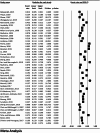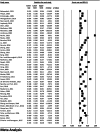Global prevalence of depression, anxiety, and stress in the elderly population: a systematic review and meta-analysis
- PMID: 39367305
- PMCID: PMC11451041
- DOI: 10.1186/s12877-024-05311-8
Global prevalence of depression, anxiety, and stress in the elderly population: a systematic review and meta-analysis
Abstract
Background: Several preliminary studies have been conducted in the field of the prevalence of depression, anxiety, and stress in the elderly population. These studies have examined the prevalence in limited geographic areas with small sample sizes. Also, there are many limitations in the meta-analysis studies. The objective of the present study was to synthesize the global prevalence statistics of depression, anxiety, and stress in the elderly population through a systematic review and meta-analysis.
Methods: The present systematic review included retrieval of primary studies from the oldest relevant study up to 2023. To find the relevant studies, international databases such as Scopus, Embase, PubMed, and Web of Science (WoS) were systematically searched. Also, a manual search was performed through the Google Scholar search engine and a review of the sources of related articles. The qualitative assessment of the studies was conducted using the Joanna Briggs Institute (JBI) checklist. Due to a high heterogeneity among the study results, a Random Effects model was chosen.
Results: A total of 42 articles on depression, 47 articles on anxiety and 13 articles on stress were included in the meta-analysis. The overall estimates for prevalence based on a random-effects model were as follows: depression, 19.2% (95% CI: 13.0 - 27.5%); anxiety, 16.5% (95% CI: 11.1 - 22.8%); and stress, 13.9% (95% CI: 5.5 - 30.9%). The highest prevalence of depression and anxiety was recorded in Africa. The prevalence of depression was higher in nursing homes, and stress was more prevalent in individuals with COVID-19 compared to other populations.
Conclusion: The findings revealed a high prevalence of depression, anxiety, and stress in the elderly population. Therefore, it is recommended that healthcare professionals and policymakers pay more attention to the prevention and management of these disorders in the elderly population.
Keywords: Anxiety; Depression; Elderly population; Meta‑analysis; Prevalence; Systematic review.
© 2024. The Author(s).
Conflict of interest statement
The authors declare no competing interests.
There is no confict of interest.
Figures







References
-
- Kalstad AA, Myhre PL, Laake K, Tveit SH, Schmidt EB, Smith P, et al. Effects of n-3 fatty acid supplements in elderly patients after myocardial infarction: a randomized, controlled trial. Circulation. 2021;143(6):528–39. - PubMed
-
- Whittington FJ, Kunkel SR, de Medeiros K. Global aging–comparative perspectives on aging and the life course. Culture. 2019;3:4.
-
- Hurjui I, Hurjui CM. Population aging and the influence on healthcare spending. ROMANIAN J Legal Med. 2018;26(4):453–6.
-
- Mar L. Population Aging in Canada: examining the caregiving needs of the elderly. Sociol Imagination: Undergrad J. 2020;6(1):67–78.
Publication types
MeSH terms
LinkOut - more resources
Full Text Sources
Medical

